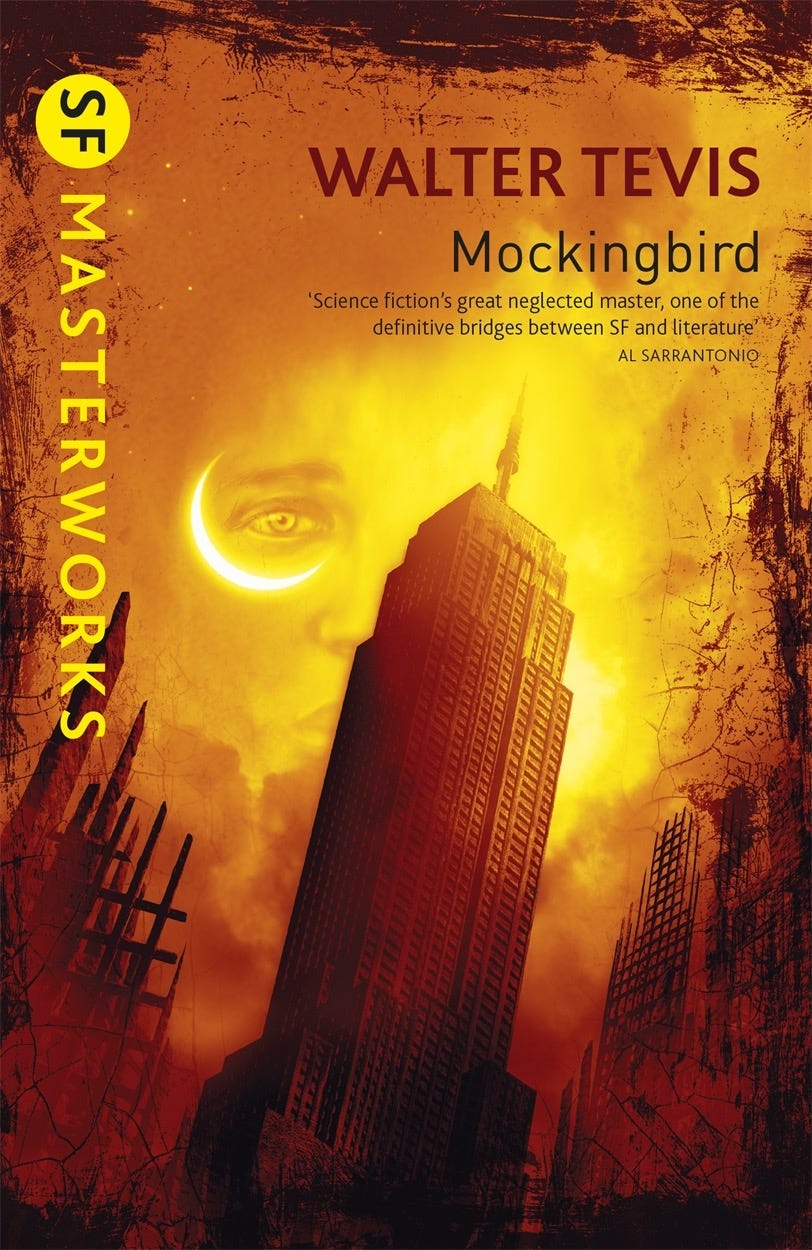Mockingbird (1980) by Walter Tevis is a dystopian sci-fi novel about a post-scarcity society in which all the drudgery has been automated and people spend their lives gazing inward. The book tells the story of Paul Bentley, a lecturer at a University, who learns to read—in a world without books—after stumbling across Spot the Dog whilst looking for some “ancient porno films” to use in a course.
Bentley's world has been shaped by “engineer-planners” who want to avoid the belligerence of 20th Century man and make him docile. The last representative of these planners is Robert Spofforth, a super-intelligent android who is suicidal but whose programming makes him incapable of killing himself. Spofforth is 245 years old and provides much of the context as there are no longer physical records.
The civilization of Mockingbird was planned as a utopia in which “poverty, disease, dissension, neurosis, and pain would be absent.” Alas, it turns out to be a boring dystopia, a futuristic world with incompetent technology, familiar to anyone who has used a supermarket self-checkout. Mockingbird is full of dumb, broken robots that no one knows how to fix. Clothes, food, transport are all automated, leading to some comic moments: “No one in St. Louis had had pockets for years, and everyone’s shirts had been too big.”
A planned society works best if it achieves ideological conformity. The easiest way to do this through education. Children in Mockingbird are raised in dormitories away from their families and instructed by video to avoid eye contact and embrace hedonism. There is not much rebellion. “The Detectors [robot police] don’t detect anything,” she said. “Maybe they never did. They don’t have to. Everybody is so conditioned from childhood that nobody ever does anything.” The punishment model is Skinnerian, bringing learned helplessness along with it.
Despite lessons in meditation, the citizens in Mockingbird are fragile and easily triggered. They are always smoking dope and popping valium to calm themselves down. As in our own age, people avoid engaging with reality, watching “dazzling colored holographs of mind shows—abstract shapes and hypnotic colors and numbingly loud music—or sex-and-pain shows or trial-by-fire shows.”
Everyone lives alone, developing their inwardness, “but they all looked the same and acted the same, with their quiet voices and their expressionless faces.” It is ostensibly a critique of the individualism of 1970s hippies, but there is much in the book that is relevant to today.
The age of grand visionary utopias is over. We are now seemingly content to allow technocrats to keep the world ticking over rather than bring about transformational changes to the human spirit. Whenever we do hear about big ideas, they usually point towards a world like Mockingbird.
The so-called Great Reset of the World Economic Forum promises to turn the masses into hedonistic, dependent serfs, plugged into virtual reality. We may avoid scarcity by eating bugs and living in pods, but it is not exactly a life worth living.
Ideas like UBI and fully-automated luxury communism feel quaint now as we face war, inflation, displacement, climate chaos, disease, and famine. But even if we did have the kind of stability required to get them off the ground, I wonder what would people end up doing with their free time. Wasn't a post-scarcity society meant to be full of adventure (as in Star Trek) or infinite creativity (as in Down and Out in the Magic Kingdom)?
The alternative to dystopia in Mockingbird is a return to nature and work. Paul Bentley, after the trials he endures, becomes physically vital: “tanned, lean, and muscular [...] springy, taut, and strong.” After the sharp critique of the first half of the book, the latter half is less convincing and feels like a man desperately trying to emerge from a mid-life crisis, which is what tends to happen in all late Walter Tevis novels.
Walter Tevis found success with The Hustler (1959) and The Man Who Fell to Earth (1963), then wasted years of his life as an alcoholic. Mockingbird began a late burst of literary activity that continued with The Queen’s Gambit (1983) and The Color of Money (1984) before he died of lung cancer in 1984. His books are less famous than the iconic adaptations that have been made of them but they are evocative and have a wildness lacking in the film versions. Thanks to Netflix’s version of The Queen’s Gambit, Tevis is back in the cultural continuum and Vintage are about to reissue all his novels in a unified edition.
This is no less than he deserves: he is a unique talent with a particular perspective and Mockingbird is one of the great sci-fi novels; it is as prescient as Nineteen Eighty-Four and as delightful as Flowers for Algernon. I don't know of any speculative fiction that better grasps the melancholy stupidity of the modern age and how the advance of technology can lead to a withering away of human faculties.




